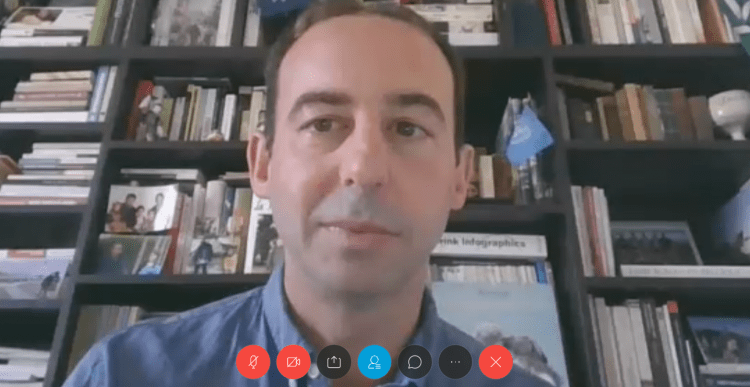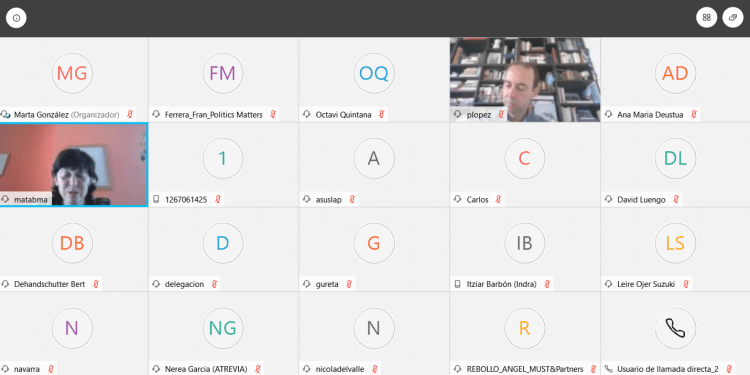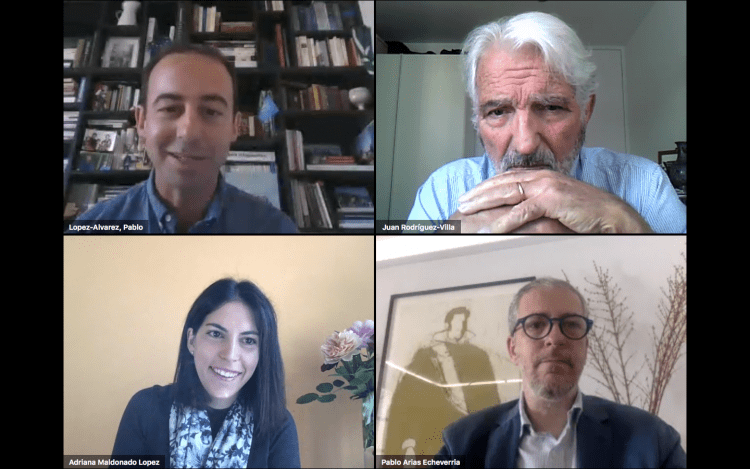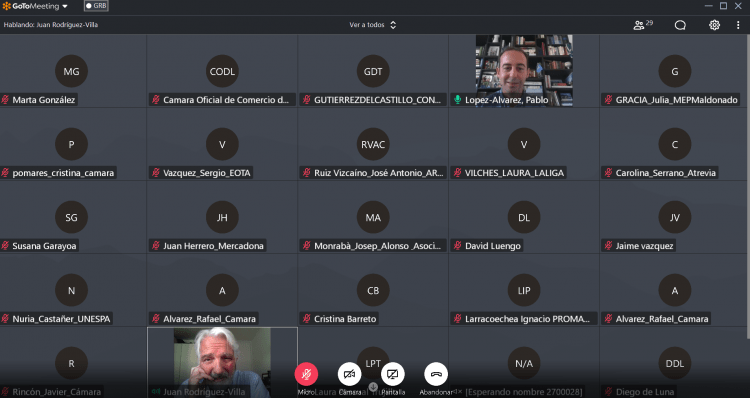Online Breakfast-Debate with Cristina Rueda-Catry, Member of Cabinet of Phil Hogan, EU Commissioner for Trade
On June 3rd, the Official Spanish Chamber of Commerce in Belgium and Luxembourg hosted a new session of its Breakfast Debates, a platform for meetings between Spanish companies and European Institutions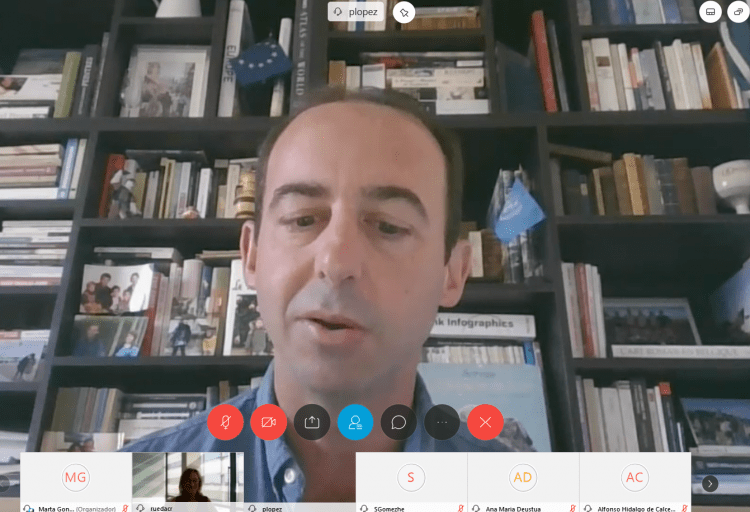 . The event was addressed by Cristina Rueda-Catry, Member of Cabinet of Phil Hogan, EU Commissioner for Trade and covered “Implications of Covid for the European trade policy and the structure of supply chains”. Given the exceptional circumstances of the spread of COVID-19 in Belgium, this breakfast debate was held online and was attended by representatives of member companies of the Chamber, managers of companies, multinationals and Spanish Regional Delegations.
. The event was addressed by Cristina Rueda-Catry, Member of Cabinet of Phil Hogan, EU Commissioner for Trade and covered “Implications of Covid for the European trade policy and the structure of supply chains”. Given the exceptional circumstances of the spread of COVID-19 in Belgium, this breakfast debate was held online and was attended by representatives of member companies of the Chamber, managers of companies, multinationals and Spanish Regional Delegations.
Pablo López Álvarez, Vice-President of the Chamber and moderator of the event, welcomed the speaker and thanked all the attendees for their participation. He began with a presentation of the speaker and gave a quick introduction to the current situation we are facing, which is undoubtedly affecting the priorities and activity of the Commission.
Then, on behalf of our member company and sponsor of the event Van Bael & Bellis, a law firm specialized in EU Commercial Law, its partner Pablo Muñiz took the floor and thanked the speaker and all attendees for their participation in this event.
Cristina Rueda began by explaining how this pandemic has overtaken all sectors of society and that it will reach both public health and the economy, given this the European Commission is paying attention to the economic recovery of its members and companies.
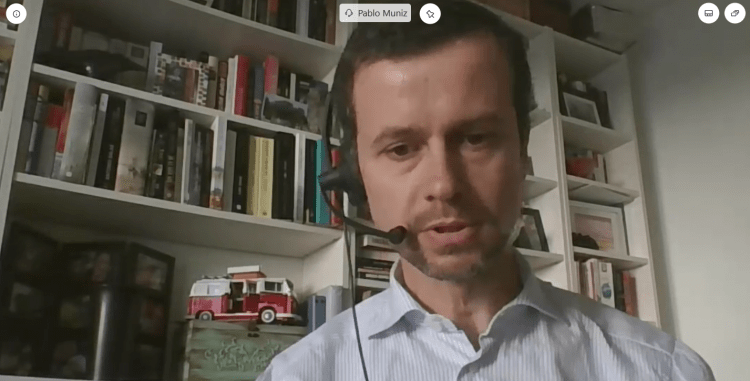 During her speech, Rueda explained how this crisis has impacted the world trade with a drastic drop in both exports and imports in Europe. The speaker highlighted that world trade was one of the main growth booster of the European Union and that a proactive trade policy will be necessary for its recovery. European trade policy has seen many changes during this crisis, so a new revision of it will be necessary, giving the EU the leadership to guarantee greater resilience and sustainability. This will be achieved, among many other points, by supporting SMEs, diversifying supply chains, protecting companies and workers or keeping the markets open, when companies integrate the needs of the workers and society. She also informed that it will be crucial for this recovery to guarantee the diversity of the offer and to reinforce the anti-dumping duties that protect many jobs and companies from unfair practices. In another area, she reminded that the relaxation of the State aid regulations is merely temporary and that this practice should not be over-extended so that it is not perceived negatively by our present and future trade partners.
During her speech, Rueda explained how this crisis has impacted the world trade with a drastic drop in both exports and imports in Europe. The speaker highlighted that world trade was one of the main growth booster of the European Union and that a proactive trade policy will be necessary for its recovery. European trade policy has seen many changes during this crisis, so a new revision of it will be necessary, giving the EU the leadership to guarantee greater resilience and sustainability. This will be achieved, among many other points, by supporting SMEs, diversifying supply chains, protecting companies and workers or keeping the markets open, when companies integrate the needs of the workers and society. She also informed that it will be crucial for this recovery to guarantee the diversity of the offer and to reinforce the anti-dumping duties that protect many jobs and companies from unfair practices. In another area, she reminded that the relaxation of the State aid regulations is merely temporary and that this practice should not be over-extended so that it is not perceived negatively by our present and future trade partners.
On the other hand, the speaker reported on the agenda of bilateral negotiations with Latin America, in which she explained some of the agreements that are currently under negotiation with Mexico or Chile as well as the single bilateral agreement with MERCOSUR that will allow great savings in rates and which is unique since the block does not have other  similar agreements.
similar agreements.
Finally, Rueda informed that, in these months of great activity that lie ahead, it will be essential that all interested companies participate in the forthcoming consultations and debates of the European Commission, not only to face the challenges of Covid but in all sectors that already had problems previously that also have been affected by this crisis.
During the Q&A session, participants were able to raise many questions of interest to them. Thus, various topics were discussed such as the impact of this crisis on the negotiation and implementation of free trade agreements, the agreements with China and India or the sustainable development measures that will be carried out during the economic recovery.
The Spanish Chamber of Commerce in Belgium and Luxembourg would like to thank Cristina Rueda-Catry, all the participants in this session and our member Van Bael & Bellis for sponsoring this event.
Sponsored by:

